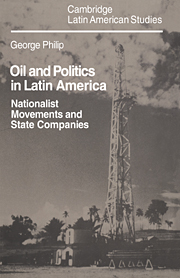Book contents
- Frontmatter
- Contents
- List of tables
- Preface
- Glossary
- Abbreviations
- Note on currencies and other units of measurement
- Maps: Latin America in 1920, 1940, 1960 and 1981; showing importing countries, exporting countries and countries self-sufficient in oil
- Introduction: The politics of oil in twentieth-century Latin America
- Part I The world oil environment
- Part II The major expropriations
- 7 Politics and the concession contract
- 8 Argentina: YPF, Yrigoyen and the 1935 oil law
- 9 Some nationalisations of the 1930s: Chile, Uruguay, Bolivia
- 10 Cárdenas and the Mexican oil nationalisation
- 11 The formation of Petrobrás
- 12 The nationalisation of the ipc in Peru
- 13 The nationalisation of Gulf Oil in Bolivia 1969
- 14 Oil politics in Ecuador 1972–6
- 15 The nationalisation of oil in Venezuela
- 16 Oil companies and governments in twentieth-century Latin America
- Part III The state oil companies
- Notes and bibliography
- Index
- CAMBRIDGE LATIN AMERICAN STUDIES
7 - Politics and the concession contract
Published online by Cambridge University Press: 23 December 2009
- Frontmatter
- Contents
- List of tables
- Preface
- Glossary
- Abbreviations
- Note on currencies and other units of measurement
- Maps: Latin America in 1920, 1940, 1960 and 1981; showing importing countries, exporting countries and countries self-sufficient in oil
- Introduction: The politics of oil in twentieth-century Latin America
- Part I The world oil environment
- Part II The major expropriations
- 7 Politics and the concession contract
- 8 Argentina: YPF, Yrigoyen and the 1935 oil law
- 9 Some nationalisations of the 1930s: Chile, Uruguay, Bolivia
- 10 Cárdenas and the Mexican oil nationalisation
- 11 The formation of Petrobrás
- 12 The nationalisation of the ipc in Peru
- 13 The nationalisation of Gulf Oil in Bolivia 1969
- 14 Oil politics in Ecuador 1972–6
- 15 The nationalisation of oil in Venezuela
- 16 Oil companies and governments in twentieth-century Latin America
- Part III The state oil companies
- Notes and bibliography
- Index
- CAMBRIDGE LATIN AMERICAN STUDIES
Summary
We have already considered the international dimension of oil conflicts in Latin America. It remains to look at conflicts which have taken place within particular Latin American countries. Ten case studies will be presented, all of them culminating either in some form of expropriation or exclusion of foreign companies, but, as will be apparent, they differ in a number of significant ways. They include a number of genuine confrontations (Mexico 1938, Peru 1968 and Bolivia 1969) but also a number of more ambiguous cases in which conflict coincided with a considerable degree of mutual accommodation. Naturally, selecting as case studies relations which culminated in expropriation does focus the presentation clearly on conflict; cases can be found of long-term and relatively harmonious relations between foreign company and host government and these have been excluded here, or at best considered only when they came to an end. However, while it should certainly be recognised that fairly harmonious government–company relationships have occurred at various times, with differing consequences for the domestic economy and political society, cases of overt conflict have been more frequent. All of the oil-producing countries of Latin America (with the very recent exception of Guatemala) have set up state oil companies and most have promoted the expansion of these companies by some combination of expropriation or exclusion. The more spectacular nationalisations or nationalist campaigns, moreover, have entered the Latin American folk memory, even if not always quite in the manner in which they actually took place.
- Type
- Chapter
- Information
- Oil and Politics in Latin AmericaNationalist Movements and State Companies, pp. 159 - 161Publisher: Cambridge University PressPrint publication year: 1982



